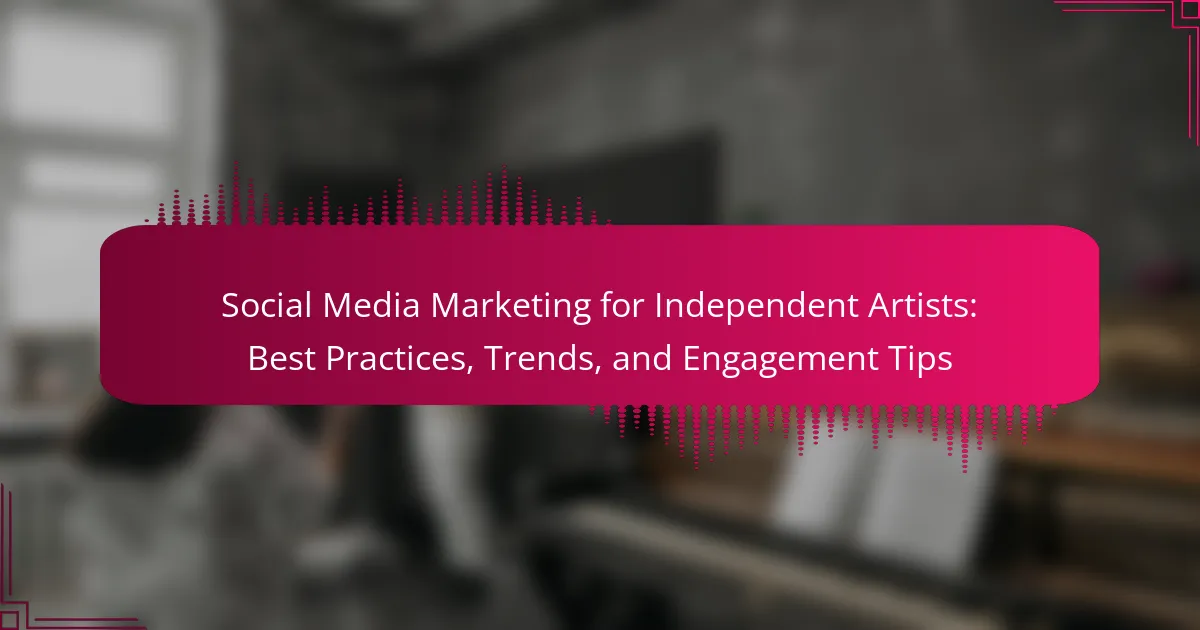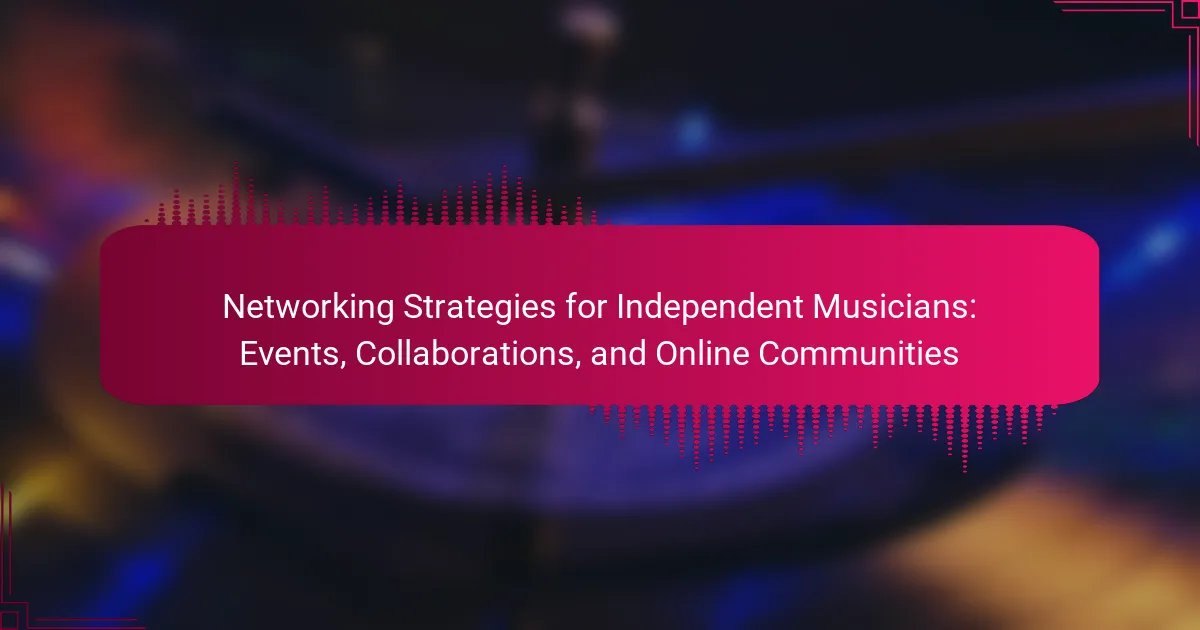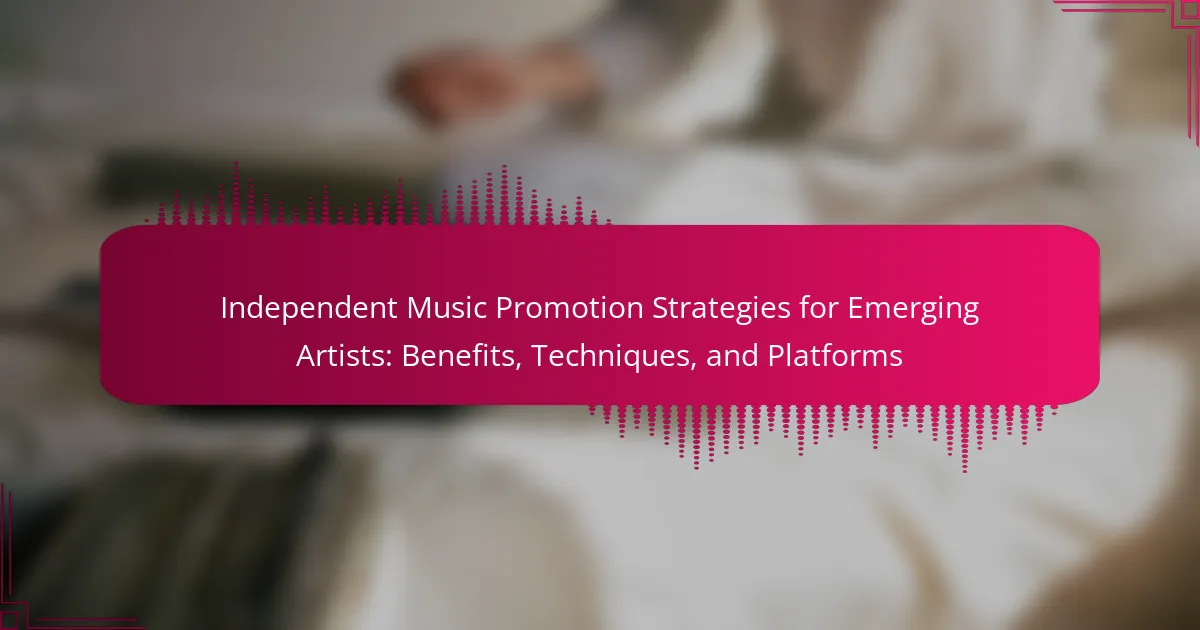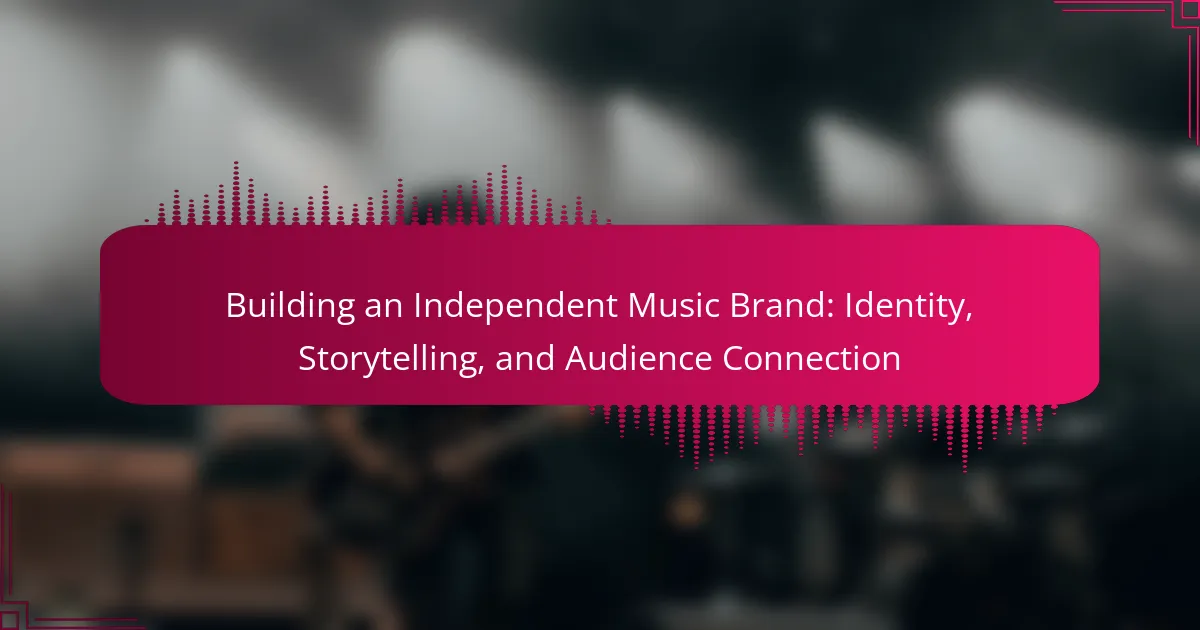Crowdfunding provides musicians with essential financial support and fosters a strong connection with their audience. This article explores key platforms like Kickstarter and Patreon, effective strategies for successful campaigns, and inspiring success stories from artists like Amanda Palmer and Chance the Rapper. Learn how to engage fans, set realistic goals, and leverage social media for impactful crowdfunding initiatives.
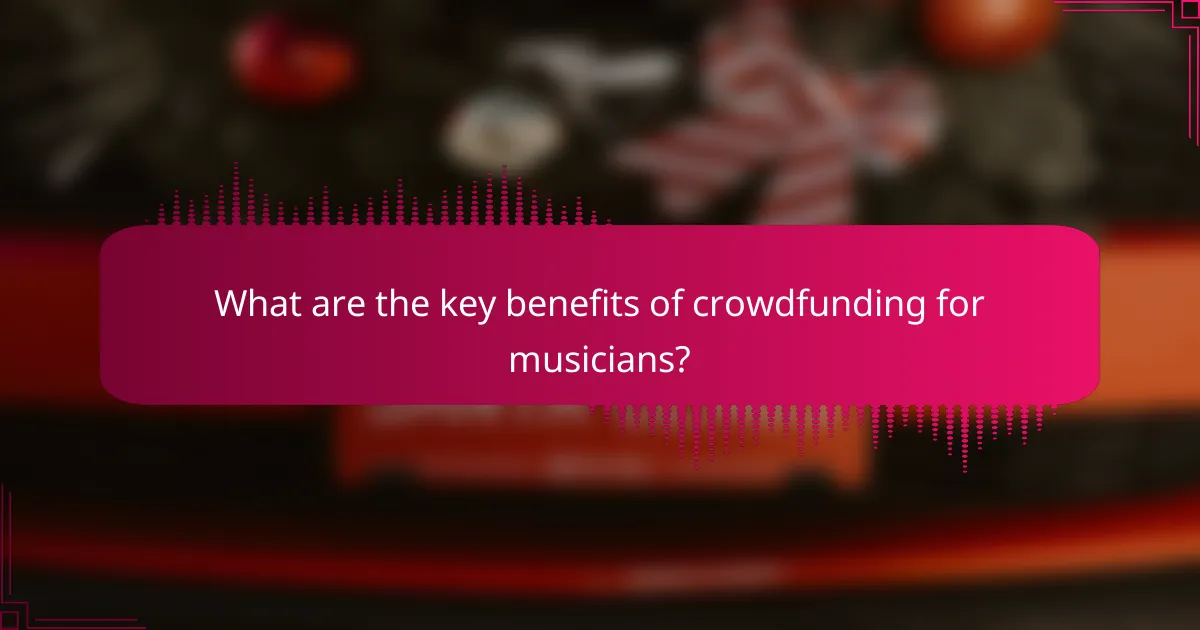
What are the key benefits of crowdfunding for musicians?
Crowdfunding offers musicians financial support, audience engagement, and creative freedom. It allows artists to fund projects directly from fans, fostering community and loyalty. Platforms like Kickstarter and Indiegogo facilitate this process, enabling musicians to share their vision and receive backing. Successful campaigns often include rewards for contributors, enhancing the connection between artists and supporters.
How does crowdfunding empower independent artists?
Crowdfunding empowers independent artists by providing a platform to raise funds directly from their audience. It allows musicians to finance projects without traditional gatekeepers. Crowdfunding fosters community engagement, enabling fans to feel invested in the artist’s success. Successful campaigns often showcase unique rewards, enhancing the connection between artists and supporters.
What financial advantages does crowdfunding offer?
Crowdfunding offers musicians financial advantages such as access to capital without traditional loans, direct fan engagement, and marketing opportunities. This funding method allows artists to retain ownership of their work while generating pre-sales for albums or merchandise. Additionally, crowdfunding platforms often provide valuable analytics on audience preferences, enhancing future projects.
How can crowdfunding enhance fan engagement?
Crowdfunding enhances fan engagement by allowing musicians to involve their supporters directly in the creation process. Fans feel a sense of ownership and investment in projects, increasing loyalty. Platforms like Kickstarter and Patreon facilitate this connection through tiered rewards, exclusive content, and direct communication. As a result, musicians can build stronger communities and receive valuable feedback during their creative journeys.
What role does crowdfunding play in project validation?
Crowdfunding validates projects by gauging audience interest and securing financial backing. It allows musicians to test their concepts and build a fan base before full production. Successful campaigns often demonstrate market demand, providing artists with insights into their audience’s preferences. This feedback loop can refine their artistic direction and enhance future projects.
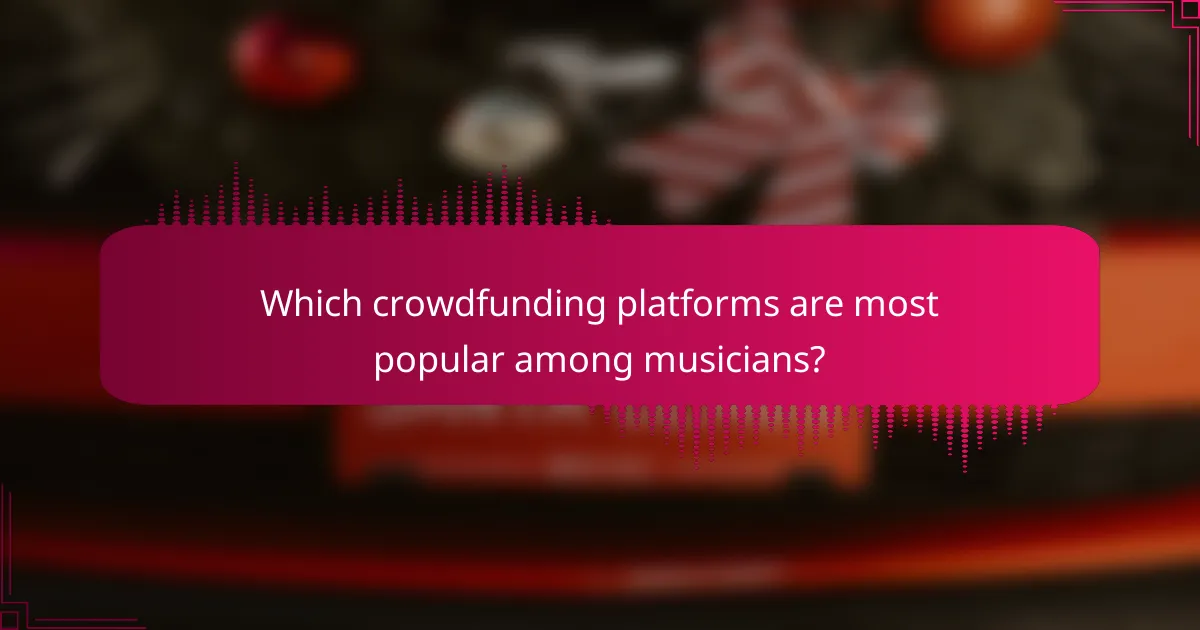
Which crowdfunding platforms are most popular among musicians?
The most popular crowdfunding platforms among musicians include Kickstarter, Indiegogo, Patreon, GoFundMe, and PledgeMusic. Each platform offers unique features catering to different needs.
Kickstarter is known for project-based funding, while Indiegogo allows flexible funding options. Patreon focuses on subscription-based support, providing ongoing revenue. GoFundMe is often used for personal projects and emergencies. PledgeMusic specializes in music-specific campaigns, enhancing artist visibility.
These platforms empower musicians to connect with fans and secure financial backing for their creative endeavors.
What are the unique features of Kickstarter for musicians?
Kickstarter offers unique features for musicians, including project visibility, community engagement, and tiered rewards. Musicians can showcase their work and connect with fans, fostering a sense of community. The platform’s all-or-nothing funding model encourages backers to contribute, knowing projects must meet funding goals. Additionally, musicians can create unique reward tiers, such as exclusive merchandise or private concerts, enhancing backer engagement. These attributes make Kickstarter a powerful tool for musicians seeking financial support and audience connection.
How does Indiegogo cater to the needs of artists?
Indiegogo supports artists by providing a platform tailored for creative projects, enabling funding through crowdfunding. Artists benefit from flexible funding options, allowing them to keep raised funds even if they don’t reach their goal. The platform also offers promotional tools, helping artists connect with potential backers. Success stories highlight how musicians have launched albums and tours, showcasing the platform’s effectiveness in the creative sector.
What advantages does Patreon provide for ongoing support?
Patreon offers musicians consistent revenue, direct fan engagement, and creative freedom. Musicians can set subscription tiers for fans, providing exclusive content and experiences. This model fosters community and loyalty, enhancing long-term support. Additionally, Patreon allows for flexible funding, enabling artists to focus on their craft without financial pressures.
Which niche platforms are emerging for music crowdfunding?
Emerging platforms for music crowdfunding include Patreon, Bandcamp, and Kickstarter, each offering unique features for musicians. Patreon allows artists to create subscription-based support, while Bandcamp focuses on direct sales and fan engagement. Kickstarter is known for project-based funding with clear goals and rewards. These platforms reflect a shift towards community-driven support in the music industry.
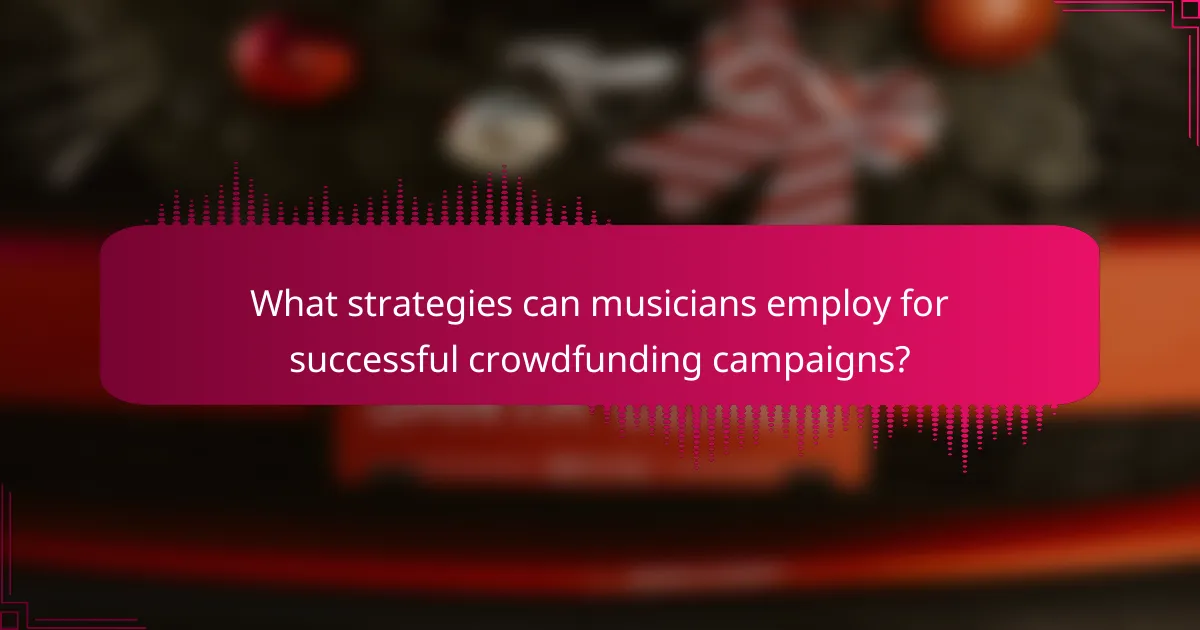
What strategies can musicians employ for successful crowdfunding campaigns?
Musicians can employ various strategies for successful crowdfunding campaigns, including building a strong community, offering compelling rewards, and leveraging social media. Engaging potential backers through storytelling enhances emotional connection. Clear goals and transparent updates keep supporters informed and invested. Collaborating with influencers can broaden reach and attract new audiences.
How can musicians effectively set funding goals?
Musicians can effectively set funding goals by analyzing project costs, audience size, and engagement levels. Start by determining the total budget required for the project, including production, marketing, and distribution expenses. Next, assess your fanbase to estimate potential contributions. Utilize crowdfunding platforms like Kickstarter and Indiegogo to benchmark similar projects, which can inform realistic funding targets. Establish clear milestones to track progress and maintain transparency with backers, fostering trust and encouraging higher contributions.
What marketing techniques are most effective for promoting campaigns?
Crowdfunding for musicians thrives on engaging storytelling, targeted marketing, and social media promotion. Effective techniques include leveraging platforms like Kickstarter and Indiegogo, utilizing email campaigns, and collaborating with influencers. Engaging visuals and regular updates enhance backer involvement, leading to increased funding success.
How important is storytelling in crowdfunding success?
Storytelling is crucial for crowdfunding success, especially for musicians. It creates emotional connections, engages potential backers, and conveys the artist’s vision. A compelling narrative can significantly enhance the likelihood of reaching funding goals. Studies show that campaigns with strong storytelling elements often exceed their targets by over 50%. Engaging stories highlight unique attributes, such as personal journeys or innovative projects, making them resonate with audiences. This approach transforms funding into a community-driven experience, fostering loyalty and support among backers.
What role do rewards play in attracting backers?
Rewards play a crucial role in attracting backers to crowdfunding campaigns for musicians. They incentivize potential supporters by offering tangible benefits, creating a sense of community, and enhancing emotional engagement. Effective rewards can include exclusive content, merchandise, or personalized experiences, which differentiate campaigns and appeal to diverse backer motivations. By aligning rewards with the target audience’s interests, musicians can significantly increase their chances of success in crowdfunding initiatives.
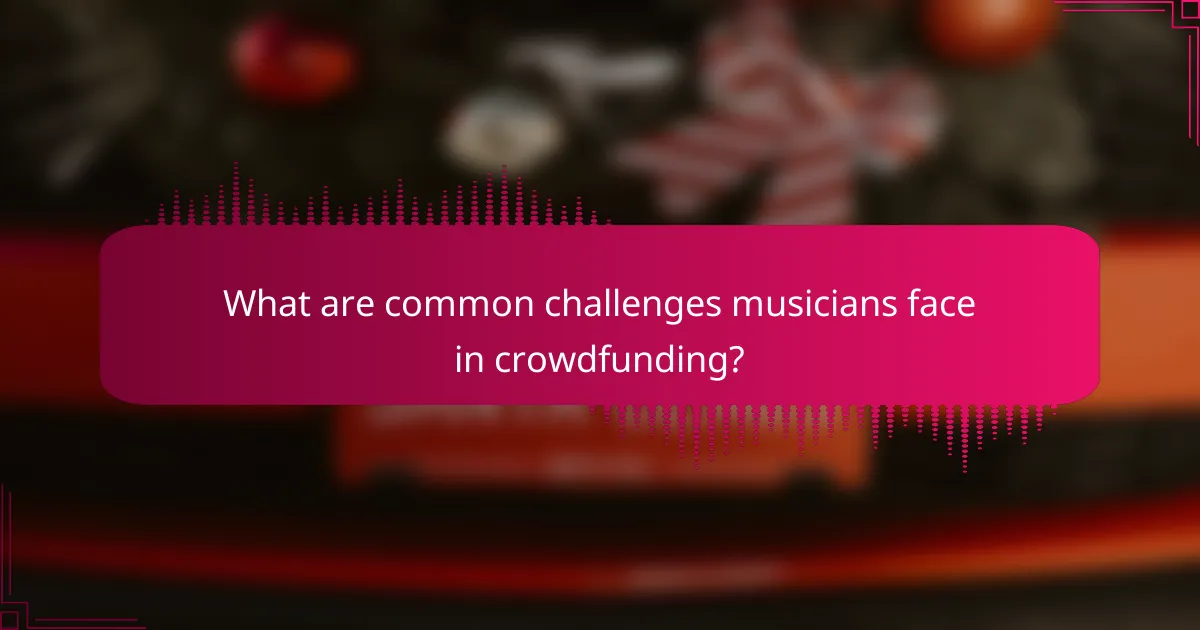
What are common challenges musicians face in crowdfunding?
Musicians commonly face challenges such as building a loyal fan base, setting realistic funding goals, and effectively marketing their campaigns. Many struggle with competition on crowdfunding platforms and may lack experience in creating engaging content. Additionally, they often encounter difficulties in maintaining momentum throughout the campaign duration.
How can musicians overcome funding shortfalls?
Musicians can overcome funding shortfalls by leveraging crowdfunding platforms, employing effective strategies, and learning from success stories. Platforms like Kickstarter and Indiegogo allow artists to present their projects and attract financial support directly from fans. Successful campaigns often utilize engaging storytelling, compelling visuals, and clear funding goals. For instance, musicians can offer exclusive rewards to backers, such as early access to music or personalized merchandise. By analyzing successful campaigns, musicians can refine their approaches, ensuring they resonate with their target audience and maximize funding potential.
What issues arise from campaign management?
Campaign management can lead to issues such as lack of visibility, miscommunication, and insufficient funding. Poor planning often results in missed deadlines and unmet goals. Additionally, ineffective marketing strategies can hinder outreach efforts. Finally, managing backer expectations is crucial to maintaining trust and engagement.
How do musicians handle backer communication?
Musicians handle backer communication by maintaining transparency and providing regular updates. They often use platforms like Kickstarter and Patreon to engage supporters through messages, videos, and progress reports. Effective communication fosters trust and encourages continued support. Additionally, personalized responses to backer inquiries can enhance relationships and drive further contributions.
What legal considerations should musicians be aware of?
Musicians should be aware of copyright laws, contract obligations, and tax implications when crowdfunding. Understanding intellectual property rights is crucial to protect original works. Contracts with platforms and backers must be clear to avoid disputes. Additionally, income from crowdfunding may be taxable, requiring proper reporting.
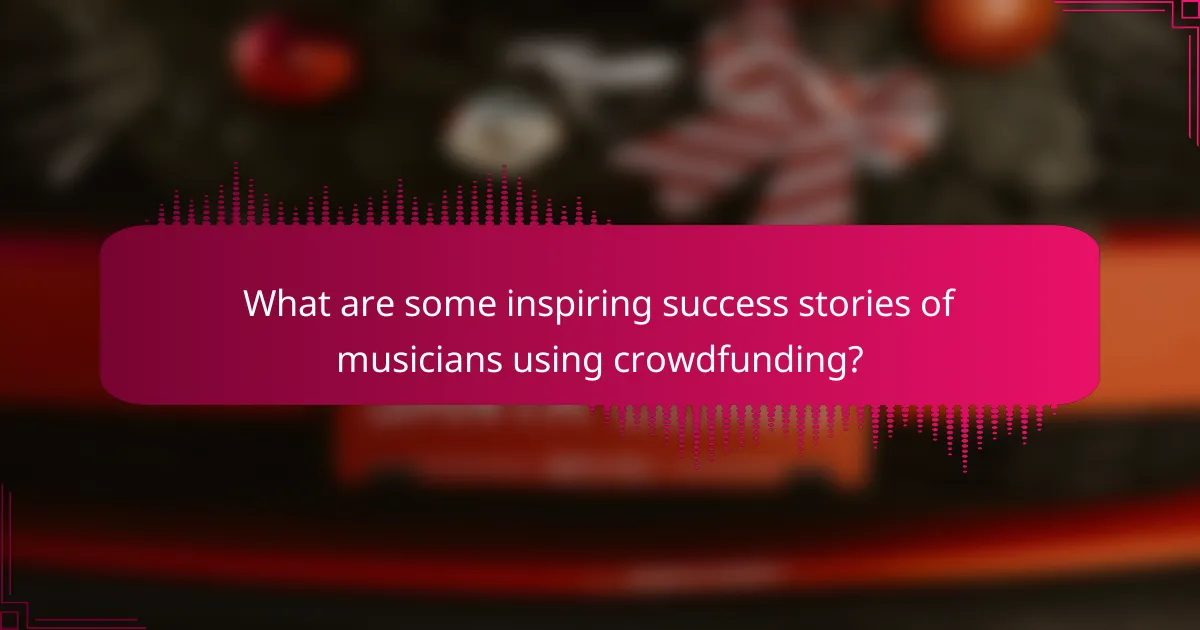
What are some inspiring success stories of musicians using crowdfunding?
Crowdfunding has empowered numerous musicians to achieve their goals. Notable success stories include Amanda Palmer, who raised over $1.2 million on Kickstarter for her album, showcasing the potential of direct fan support. Another example is the band KONGOS, which used crowdfunding to finance their album and achieved significant commercial success afterward. Additionally, the artist Chance the Rapper funded his projects independently, demonstrating the effectiveness of leveraging platforms for creative freedom. These examples highlight the diverse strategies musicians employ to engage their fanbase and secure funding.
Which notable albums were funded through crowdfunding?
Several notable albums have successfully utilized crowdfunding. Examples include “The 20/20 Experience” by Justin Timberlake, “The Amory Wars” by Coheed and Cambria, and “The New Adventures of Old Christine” by the band The Decemberists. These projects highlight the effectiveness of platforms like Kickstarter and Indiegogo in enabling musicians to finance their creative endeavors directly through fan support.
How have artists leveraged crowdfunding for tours?
Artists have effectively leveraged crowdfunding for tours by utilizing platforms like Kickstarter and Indiegogo. These platforms allow musicians to connect directly with fans, offering unique rewards and experiences in exchange for financial support. Successful campaigns often highlight personal stories and specific tour goals, fostering a sense of community and investment among backers. For example, many artists share behind-the-scenes content, creating transparency and engagement that enhances their fundraising efforts. This strategy not only secures funding but also strengthens fan relationships, making it a vital tool in the modern music industry.
What lessons can be learned from failed campaigns?
Failed crowdfunding campaigns for musicians offer valuable lessons in planning and execution. Key insights include the importance of clear goals, effective marketing strategies, and engaging storytelling. Campaigns lacking transparency often struggle, highlighting the need for clear communication about funding uses. Additionally, understanding the target audience enhances engagement, as campaigns that resonate with specific demographics tend to succeed. Lastly, setting realistic funding goals can prevent disappointment and foster trust among backers.
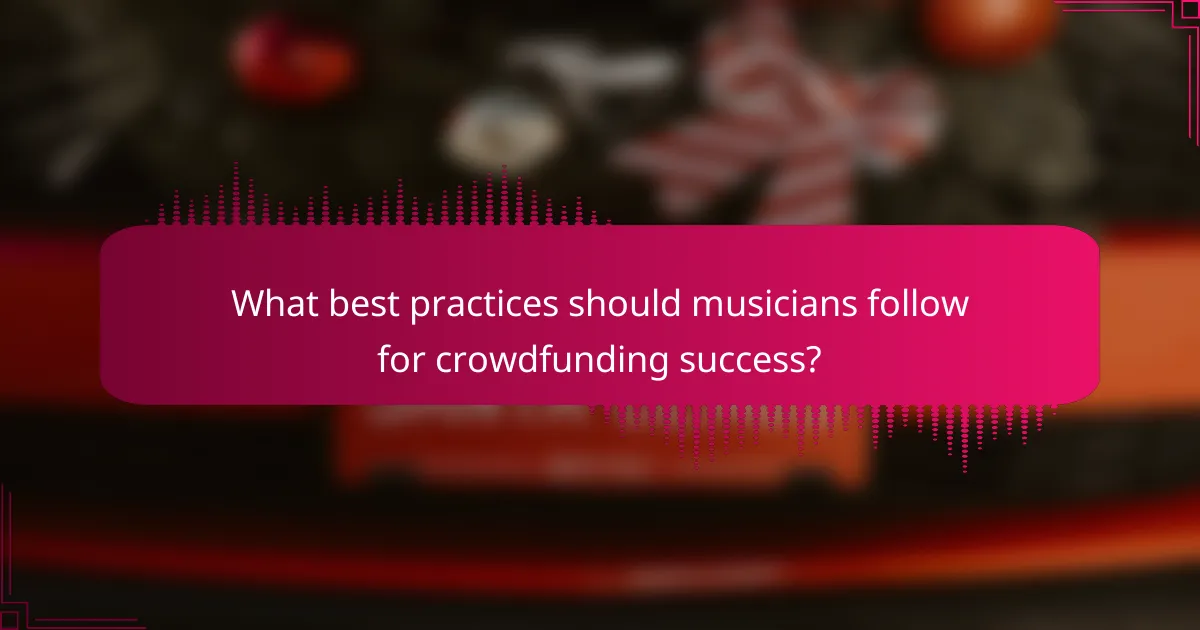
What best practices should musicians follow for crowdfunding success?
Musicians should engage their audience, set clear goals, and offer compelling rewards for crowdfunding success. Building a strong social media presence can enhance visibility. Consistent updates throughout the campaign keep backers informed and engaged. Successful examples show that personal stories resonate well with potential supporters.
How can musicians create compelling campaign videos?
Musicians can create compelling campaign videos by focusing on storytelling, authenticity, and engaging visuals. These elements resonate with audiences and enhance emotional connections.
Incorporate personal narratives that highlight the musician’s journey and the purpose of the crowdfunding campaign. Authenticity builds trust and encourages support. Use high-quality visuals and sound to captivate viewers, showcasing the artist’s personality and style.
Additionally, leverage social media platforms to share behind-the-scenes content and updates. This keeps the audience engaged and fosters a community around the campaign. Consistent communication can lead to increased interest and funding success.
What tips are essential for engaging with backers?
Engaging with backers requires clear communication, transparency, and a compelling narrative. Start by sharing your vision and goals to connect emotionally. Regular updates build trust and keep backers informed. Offer exclusive rewards to incentivize support. Foster community interaction through social media to strengthen relationships.
How should musicians evaluate their campaign performance?
Musicians should evaluate their campaign performance by analyzing funding goals, backer engagement, and promotional effectiveness. Focus on metrics like total funds raised, number of backers, and social media reach. This data reveals strengths and areas for improvement in future campaigns.
What common mistakes should musicians avoid in crowdfunding?
Musicians should avoid common mistakes like setting unrealistic funding goals, neglecting promotion, failing to engage backers, and not delivering on promises. These errors can undermine credibility and hinder future crowdfunding efforts. Prioritize clear communication and consistent updates to maintain supporter trust.
